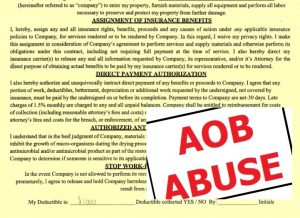One-way attorney fees law blamed
 The latest figures show the number of Assignment of Benefits (AOB) lawsuits continue to rise in Florida, up 18% in 2018 from the year prior – and up 900% from 2008. Despite the increase, the troublesome lawsuits remain concentrated within a disproportionately small number of lawyers and firms, utilizing a loophole in the state’s one-way attorney fees law.
The latest figures show the number of Assignment of Benefits (AOB) lawsuits continue to rise in Florida, up 18% in 2018 from the year prior – and up 900% from 2008. Despite the increase, the troublesome lawsuits remain concentrated within a disproportionately small number of lawyers and firms, utilizing a loophole in the state’s one-way attorney fees law.
The updated report by the Florida Justice Reform Institute uses data from the Florida Department of Financial Services’ Service of Process database, updated through 2018. It shows for the eighth year in a row, AOB lawsuits made up more than half of all litigation filed against insurance companies. From 2008 to 2018, AOB lawsuits increased by over 900%, while total lawsuits in that same period increased just over 400%.
“This lawsuit-for-profit scheme has become an incentive for trial lawyers and their vendor clients – often water damage remediation firms or auto glass shops with aggressive marketing schemes,” notes the report.
Five firms, comprising of six attorneys, filed more than 20% of all property AOB lawsuits. The concentration is even worse in auto glass cases, where nine firms, comprising of just 12 attorneys, filed nearly 85% of all AOB auto glass cases. The Institute says the driver of these growing lawsuits is Florida’s one-way attorney fee statute (627.428 F.S.), which the Florida Legislature has bills addressing this session (see this edition’s Bill Watch).
“Despite the statute’s plain text—which describes awards in favor of named insureds, named beneficiaries, and omnibus insureds— and Florida cases describing it as a benefit for policyholders, courts have extended it beyond these categories of individuals. This has caused significant distortions in the insurance marketplace and significant costs for premium payers, all for the benefit of a very few number of attorneys,” the report stated.
In a troubling development, some lawyers are also setting up their own repair businesses, so they can profit from both the abuse and the lawsuits, according to the Institute.
AOB abuse and increased litigation were cited last week by Citizens Property Insurance Corporation as part of the reason it’s seeking $200 million in traditional reinsurance coverage for the upcoming hurricane season. Those factors, along with Hurricanes Irma and Michael and non-weather water loss claims, created a $135.9 million net operating loss last year in the personal lines account of Florida’s insurer of last resort.
CFO Jennifer Montero told the Citizens Board last week that the reinsurance will reduce the personal lines surplus exposure from 62% to 52% in the event of a one-in-100 year storm. It’s part of Citizens’ $1.6 billion risk transfer package for the 2019 storm season.
LMA Newsletter of 4-1-19

